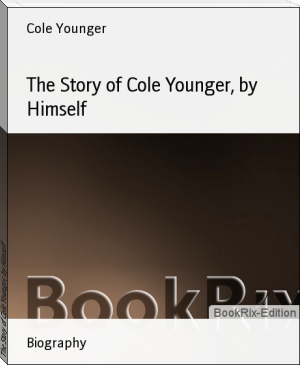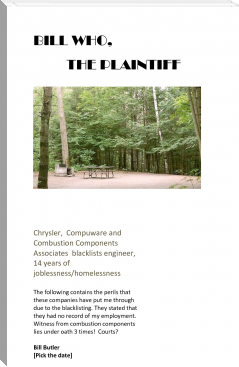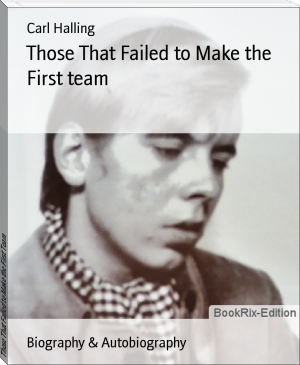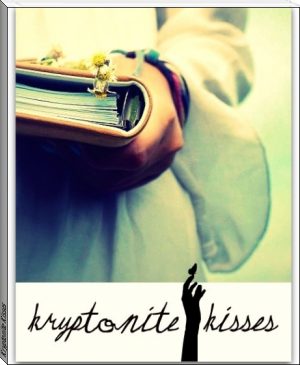The Story of Cole Younger, by Himself - Cole Younger (good novels to read in english .TXT) 📗

- Author: Cole Younger
Book online «The Story of Cole Younger, by Himself - Cole Younger (good novels to read in english .TXT) 📗». Author Cole Younger
getting on the wrong side of every public issue is as pernicious an enemy to the country as the man who openly fires upon the flag; and I have seen mute sufferings of men in prison which no human pen can portray.
And I have seen men die there. During my twenty-five years of imprisonment, I have spent a large portion of the time in the hospital, nursing the sick and soothing the dying. Oh! the sadness, the despair, the volcano of human woe that lurks in such an hour. One, a soldier from the North, I met in battle when I wore the gray. In ’63 I had led him to safety beyond the Confederate lines in Missouri, and in ’97 he died in my arms in the Minnesota prison, a few moments before a full pardon had arrived from the president.
The details of this remarkable coincidence were pathetic in the extreme, equalled only by the death of my young brother Bob.
And yet, my dear friends, prisons and prison discipline, which sometimes destroy the reason, and perpetuate a stigma upon those who survive them,—these, I say, are the safeguards of the nation.
A man has plenty of time to think in prison, and I might add that it is an ideal place for a man to study law, religion, and Shakespeare, not forgetting the president’s messages. However, I would advise you not to try to get into prison just to find an ideal place for these particular studies. I find, after careful study, that law is simply an interpretation of the Ten Commandments, nothing more, nothing less. All law is founded upon Scripture, and Scripture, in form of religion or law, rules the universe.
The infidel who ridicules religion is forced to respect the law, which in reality is religion itself.
It is not sufficient alone to make good and just laws, but our people must be educated, or should be, from the cradle up, to respect the law. This is one great lesson to be impressed upon the American people. Let the world know that we are a law-loving nation, for our law is our life.
Experience has taught me that there is no true liberty apart from law. Law is a boundary line, a wall of protection, circumscribing the field in which liberty may have her freest exercise. Beyond the boundary line, freedom must surrender her rights, and change her name to “penalty for transgression.” The law is no enemy, but the friend of liberty. The world and the planets move by law. Disregarding the law by which they move, they would become wanderers in the bleak darkness forever.
The human mind in its normal condition moves and works by law. When self-will, blinded by passion or lust, enters her realm, and breaks her protecting laws, mind then loses her sweet liberty of action, and becomes a transgressor. Chaos usurps the throne of liberty, and mind becomes at enmity with law. How many, many times the words of the poet have sung to my soul during the past twenty-six years:
Eternal spirit of the chainless mind,
Brightest in dungeon’s liberty thou art,
For there thy habitation is the heart,
The heart, which love of thee alone can bind.
Your locomotive with her following load of life and treasure is safe while she keeps the rails, but, suppose that with an insane desire for a larger liberty, she left the rails and struck out for herself a new pathway, ruin, chaos and death would strew her course. And again let me impress the fact upon you. Law is one of humanity’s valiant friends. It is the safeguard of the highest personal and national liberties. The French revolution furnishes a standing illustration of society without law.
There are times when I think the American people are not patriotic enough. Some think patriotism is necessary only in time of war, but I say to you it is more necessary in time of peace.
When the safety of the country is threatened, and the flag insulted, we are urged on by national pride to repel the enemy, but in time of peace selfish interests take the greater hold of us, and retard us in our duty to country.
Nowhere is patriotism needed more than at the ballot-box. There the two great contestants are country and self, and unless the spirit of patriotism guides the vote our country is sure to lose. To be faithful citizens we must be honest in our politics. The political star which guides us should be love for our country and our country’s laws.
Patriotism, side by side with Christianity, I would have to go down to future generations, for wherever the church is destroyed you are making room for asylums and prisons. With the martyred Garfield, I, too, believe that our great national danger is not from without.
It may be presumptuous in me to proffer so many suggestions to you who have been living in a world from which I have been exiled for twenty-five years. I may have formed a wrong conception of some things, but you will be charitable enough to forgive my errors.
I hope to be of some assistance to mankind and will dedicate my future life to unmask every wrong in my power and aid civilization to rise against further persecution. I want to be the drum-major of a peace brigade, who would rather have the good will of his fellow creatures than shoulder straps from any corporate power.
One of the lessons impressed upon me by my life experience is the power of that which we call personal influence, the power of one mind or character over another.
Society is an aggregate of units. The units are related. No one lives or acts alone, independently of another. Personal influence plays its part in the relations we sustain to each other.
Do you ask me to define what I mean by personal influence? It is the sum total of what a man is, and its effect upon another. Some one has said, “Every man is what God made him,” and some are considerably more so. That which we call character is the sum total of all his tendencies, habits, appetite and passions. The terms character and reputation are too often confused. Character is what you really are; reputation is what some one else would have you.
Every man has something of good in him. Probably none of us can say that we are all goodness.
I have noticed that when a man claims to be all goodness, that claim alone does not make his credit any better in business, or at the bank. If a man is good, the world has a way of finding out his qualities. Most men are willing to admit, at least to themselves, that their qualities are somewhat mixed. I do not believe that the good people of the world are all bunched up in one corner and the bad ones in another. Christ’s parable of the wheat and the tares explains that to my satisfaction. There is goodness in all men, and sermons even in stones. But goodness and badness is apt to run in streaks. Man, to use the language of another, is a queer combination of cheek and perversity, insolence, pride, impudence, vanity, jealousy, hate, scorn, baseness, insanity, honor, truth, wisdom, virtue and urbanity. He’s a queer combination all right. And those mixed elements of his nature, in their effects on other people, we call personal influence. Many a man is not altogether what he has made himself, but what others have made him. But a man’s personal influence is within his own control. It is at the gateway of his nature from which his influence goes forth that he needs to post his sentinels.
Mind stands related to mind, somewhat in the relation of cause and effect.
Emerson said, “You send your boy to school to be educated, but the education that he gets is largely from the other boys.” It is a kind of education that he will remember longer and have a greater influence upon his character and career in life than the instructions he gets from the teacher.
The great scholar, Elihu Burritt, has said, “No human being can come into this world without increasing or diminishing the sum total of human happiness.” No one can detach himself from the connection. There is no spot in the universe to which he can retreat from his relations to others.
This makes living and acting among our fellows a serious business. It makes life a stage, ourselves the actors—some of us being remarkably bad actors—and imposes upon us the obligation to act well our part. Therein all honor lies. And in order to do this it behooves us to stock up with the qualities of mind and character, the influence of which will be helpful to those who follow the trail behind us.
Another plain duty my experience has pointed out is that each of us owes an honest, manly effort toward the material world’s progress. Honest labor is the key that unlocks the door of happiness. One of the silliest notions that a young man can get into his head is the idea that the world owes him a living. It does not owe you the fraction of a red cent, young man. What have you done for the world that put it under obligation to you? When did the world become indebted to you? Who cared for you in the years of helpless infancy? Who built the schoolhouse where you got the rudiments of your education? The world was made and equipped for men to develop it. Almighty God furnished the world well. He provided abundant coal beds, oceans of oil, boundless forests, seas of salt. He has ribbed the mountain with gems fit to deck the brows of science, eloquence and art. He has furnished earth to produce for all the requirements of man. He has provided man himself with an intellect to fathom and develop the mysteries of His handiwork. Now He commands that mortal man shall do the rest, and what a generous command it is! And this is the world that owes you a living, is it?
This reminds me of a man who built and thoroughly equipped a beautiful church, and presented it as a gift to the congregation. After expressing their gratitude, a leading member of the church said to the generous donor: “And now may we request that you put a lightning-rod on the church to secure it against lightning?” The giver replied: “No. I have built a church wherein to worship Almighty God, and if He sees fit to destroy it by lightning, let Him strike.”
There was a church struck by lightning in New Jersey, where the big trust magnates met for worship, and the Lord is excused for visiting it with lightning. No, the Lord is not going to strike down your good works at all. He has laid out an earthly Paradise for each of us, and nothing is due us except what we earn by honest toil and noble endeavor. We owe the world a debt of gratitude we can never repay for making this a convenient
And I have seen men die there. During my twenty-five years of imprisonment, I have spent a large portion of the time in the hospital, nursing the sick and soothing the dying. Oh! the sadness, the despair, the volcano of human woe that lurks in such an hour. One, a soldier from the North, I met in battle when I wore the gray. In ’63 I had led him to safety beyond the Confederate lines in Missouri, and in ’97 he died in my arms in the Minnesota prison, a few moments before a full pardon had arrived from the president.
The details of this remarkable coincidence were pathetic in the extreme, equalled only by the death of my young brother Bob.
And yet, my dear friends, prisons and prison discipline, which sometimes destroy the reason, and perpetuate a stigma upon those who survive them,—these, I say, are the safeguards of the nation.
A man has plenty of time to think in prison, and I might add that it is an ideal place for a man to study law, religion, and Shakespeare, not forgetting the president’s messages. However, I would advise you not to try to get into prison just to find an ideal place for these particular studies. I find, after careful study, that law is simply an interpretation of the Ten Commandments, nothing more, nothing less. All law is founded upon Scripture, and Scripture, in form of religion or law, rules the universe.
The infidel who ridicules religion is forced to respect the law, which in reality is religion itself.
It is not sufficient alone to make good and just laws, but our people must be educated, or should be, from the cradle up, to respect the law. This is one great lesson to be impressed upon the American people. Let the world know that we are a law-loving nation, for our law is our life.
Experience has taught me that there is no true liberty apart from law. Law is a boundary line, a wall of protection, circumscribing the field in which liberty may have her freest exercise. Beyond the boundary line, freedom must surrender her rights, and change her name to “penalty for transgression.” The law is no enemy, but the friend of liberty. The world and the planets move by law. Disregarding the law by which they move, they would become wanderers in the bleak darkness forever.
The human mind in its normal condition moves and works by law. When self-will, blinded by passion or lust, enters her realm, and breaks her protecting laws, mind then loses her sweet liberty of action, and becomes a transgressor. Chaos usurps the throne of liberty, and mind becomes at enmity with law. How many, many times the words of the poet have sung to my soul during the past twenty-six years:
Eternal spirit of the chainless mind,
Brightest in dungeon’s liberty thou art,
For there thy habitation is the heart,
The heart, which love of thee alone can bind.
Your locomotive with her following load of life and treasure is safe while she keeps the rails, but, suppose that with an insane desire for a larger liberty, she left the rails and struck out for herself a new pathway, ruin, chaos and death would strew her course. And again let me impress the fact upon you. Law is one of humanity’s valiant friends. It is the safeguard of the highest personal and national liberties. The French revolution furnishes a standing illustration of society without law.
There are times when I think the American people are not patriotic enough. Some think patriotism is necessary only in time of war, but I say to you it is more necessary in time of peace.
When the safety of the country is threatened, and the flag insulted, we are urged on by national pride to repel the enemy, but in time of peace selfish interests take the greater hold of us, and retard us in our duty to country.
Nowhere is patriotism needed more than at the ballot-box. There the two great contestants are country and self, and unless the spirit of patriotism guides the vote our country is sure to lose. To be faithful citizens we must be honest in our politics. The political star which guides us should be love for our country and our country’s laws.
Patriotism, side by side with Christianity, I would have to go down to future generations, for wherever the church is destroyed you are making room for asylums and prisons. With the martyred Garfield, I, too, believe that our great national danger is not from without.
It may be presumptuous in me to proffer so many suggestions to you who have been living in a world from which I have been exiled for twenty-five years. I may have formed a wrong conception of some things, but you will be charitable enough to forgive my errors.
I hope to be of some assistance to mankind and will dedicate my future life to unmask every wrong in my power and aid civilization to rise against further persecution. I want to be the drum-major of a peace brigade, who would rather have the good will of his fellow creatures than shoulder straps from any corporate power.
One of the lessons impressed upon me by my life experience is the power of that which we call personal influence, the power of one mind or character over another.
Society is an aggregate of units. The units are related. No one lives or acts alone, independently of another. Personal influence plays its part in the relations we sustain to each other.
Do you ask me to define what I mean by personal influence? It is the sum total of what a man is, and its effect upon another. Some one has said, “Every man is what God made him,” and some are considerably more so. That which we call character is the sum total of all his tendencies, habits, appetite and passions. The terms character and reputation are too often confused. Character is what you really are; reputation is what some one else would have you.
Every man has something of good in him. Probably none of us can say that we are all goodness.
I have noticed that when a man claims to be all goodness, that claim alone does not make his credit any better in business, or at the bank. If a man is good, the world has a way of finding out his qualities. Most men are willing to admit, at least to themselves, that their qualities are somewhat mixed. I do not believe that the good people of the world are all bunched up in one corner and the bad ones in another. Christ’s parable of the wheat and the tares explains that to my satisfaction. There is goodness in all men, and sermons even in stones. But goodness and badness is apt to run in streaks. Man, to use the language of another, is a queer combination of cheek and perversity, insolence, pride, impudence, vanity, jealousy, hate, scorn, baseness, insanity, honor, truth, wisdom, virtue and urbanity. He’s a queer combination all right. And those mixed elements of his nature, in their effects on other people, we call personal influence. Many a man is not altogether what he has made himself, but what others have made him. But a man’s personal influence is within his own control. It is at the gateway of his nature from which his influence goes forth that he needs to post his sentinels.
Mind stands related to mind, somewhat in the relation of cause and effect.
Emerson said, “You send your boy to school to be educated, but the education that he gets is largely from the other boys.” It is a kind of education that he will remember longer and have a greater influence upon his character and career in life than the instructions he gets from the teacher.
The great scholar, Elihu Burritt, has said, “No human being can come into this world without increasing or diminishing the sum total of human happiness.” No one can detach himself from the connection. There is no spot in the universe to which he can retreat from his relations to others.
This makes living and acting among our fellows a serious business. It makes life a stage, ourselves the actors—some of us being remarkably bad actors—and imposes upon us the obligation to act well our part. Therein all honor lies. And in order to do this it behooves us to stock up with the qualities of mind and character, the influence of which will be helpful to those who follow the trail behind us.
Another plain duty my experience has pointed out is that each of us owes an honest, manly effort toward the material world’s progress. Honest labor is the key that unlocks the door of happiness. One of the silliest notions that a young man can get into his head is the idea that the world owes him a living. It does not owe you the fraction of a red cent, young man. What have you done for the world that put it under obligation to you? When did the world become indebted to you? Who cared for you in the years of helpless infancy? Who built the schoolhouse where you got the rudiments of your education? The world was made and equipped for men to develop it. Almighty God furnished the world well. He provided abundant coal beds, oceans of oil, boundless forests, seas of salt. He has ribbed the mountain with gems fit to deck the brows of science, eloquence and art. He has furnished earth to produce for all the requirements of man. He has provided man himself with an intellect to fathom and develop the mysteries of His handiwork. Now He commands that mortal man shall do the rest, and what a generous command it is! And this is the world that owes you a living, is it?
This reminds me of a man who built and thoroughly equipped a beautiful church, and presented it as a gift to the congregation. After expressing their gratitude, a leading member of the church said to the generous donor: “And now may we request that you put a lightning-rod on the church to secure it against lightning?” The giver replied: “No. I have built a church wherein to worship Almighty God, and if He sees fit to destroy it by lightning, let Him strike.”
There was a church struck by lightning in New Jersey, where the big trust magnates met for worship, and the Lord is excused for visiting it with lightning. No, the Lord is not going to strike down your good works at all. He has laid out an earthly Paradise for each of us, and nothing is due us except what we earn by honest toil and noble endeavor. We owe the world a debt of gratitude we can never repay for making this a convenient
Free e-book «The Story of Cole Younger, by Himself - Cole Younger (good novels to read in english .TXT) 📗» - read online now
Similar e-books:





Comments (0)